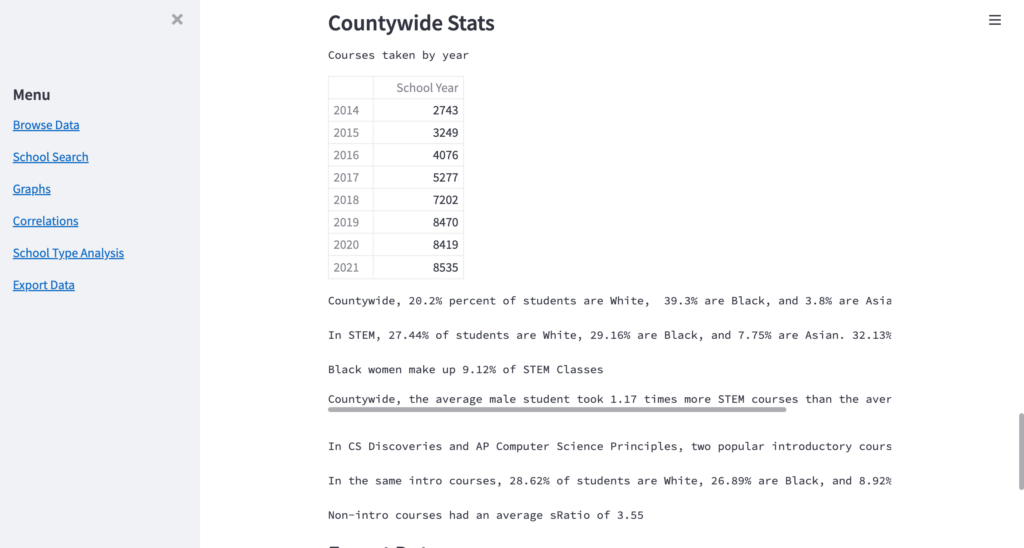By Riley Kaminer
Dylan Bober of Broward County’s Cooper City High School noticed something in his computer science classes.
“There are a lot of other male students like me, and very few female students,” he told Refresh Miami, recalling his thought process at the time. In a robotics class, there were no female students at all. “Students of color were also under-represented,” Bober noted.
For many high school students, the story would end there. But Bober, who recently won a Miami Herald Silver Knight Award for Mathematics, is far from your typical high school student.
Instead, Bober asked his school district for anonymized data around students who had taken STEM classes. They provided him with the raw data in a spreadsheet in Bober’s junior year.
During the summer before senior year, Bober took this data and used Python to develop a web app that analyzes this data. “It shows statistics and graphs that allowed me to visualize what STEM participation looks like in the district,” he explained. To create this platform, Bober leveraged the data analysis skills he acquired during two semesters of computer science through the University of Florida’s dual enrollment program and summer machine learning program.
Analyzing eight years of racial and gender enrollment data of 31,000 students in Broward’s 31 public high schools, Bober’s research found the average elective STEM class was 73% male and 27% female. His research also found that STEM classes tended to be disproportionately white and Asian.
Bober presented his findings to the district, which he said received the report well. “I was really happy with how they took it,” he said. “It made it clear that Broward County Schools had this issue, but that it’s really a nationwide or even an international issue.” On top of sharing this data, Bober also talked with his high school’s principal about how to encourage underrepresented groups to participate in STEM classes.
Why is this important? Bober said that the lack of diversity in STEM affects us all. “It leads to a lot of negative outcomes,” he asserted. “For example, bias in AI algorithms against particular groups in some cases. I think a lot of these issues can be mitigated by having a more diverse team of engineers and designers.”
According to Bober, nipping this in the bud begins in the high school classroom. “STEM is a rapidly growing industry, and everyone deserves having access to those new, high-paying jobs. How do we get students on track to eventually get STEM jobs? Studies show that it all starts in high school.”
On top of his interest in computer science, Bober is also passionate about politics and public policy. This summer, he is working as an organizer on a political campaign.
Next month, Bober will start his freshman year at Yale, where he hopes to continue tackling problems at the convergence of tech and policy. “I think a Yale education will give me the tools to drive public policy and advocate for solutions like I presented to the district,” he said. “I’m really excited to learn how to do this in a more effective and impactful way.”
Check out Bober’s app about STEM participation in Broward Schools here.

READ MORE IN REFRESH MIAMI:
- Student spotlight: This entrepreneur is using tech to streamline house cleanings
- Babson grad returns to Boca to build ticket selling platform TicketRev
- Miami-born MX Locker revs up, becoming leading digital marketplace for dirt bike gear
- AI, climatetech and healthtech reign supreme on Day 1 of eMerge Americas’ 10th anniversary - April 18, 2024
- Brought together by tech, kept together by culture: Miami’s protagonistic role in LatAm’s startup story - April 15, 2024
- New World Angels launches Innovation Fund to write pre-seed checks - April 12, 2024





